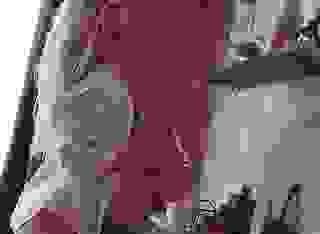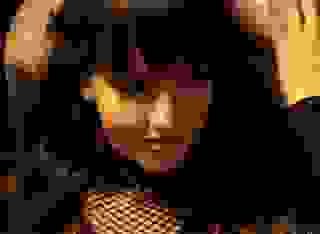Note: You can change font size, font face, and turn on dark mode by clicking the "A" icon tab in the Story Info Box.
You can temporarily switch back to a Classic Literotica® experience during our ongoing public Beta testing. Please consider leaving feedback on issues you experience or suggest improvements.
Click hereWilliam fell asleep thinking this woman probably would be trouble. She didn't seem to have any concept of what was going on if all she was concerned about was having breakfast.
It seemed to William as if he'd just dozed off when Manuia shook him awake. He looked up to see Manuia smiling.
"Comin' daytime, Mister William."
William stretched, then got up and walked to where the woman was lying. It had been too dark the night before to get a good look at her. Now, in the gray light of dawn, he took a good look before waking her.
She was dressed in a man's pants and shirt that didn't fit at all. She'd rolled up the pant legs so they didn't drag on the ground, and the shirt was more like a tent she'd put on than an actual shirt. He hadn't realized the night before that she was barefoot. It must have been pure hell for her to climb up the rocky side of the mountain, but she hadn't said a peep.
The trip up the mountain hadn't done her hair any favors either. The golden blonde locks that splayed out around her face were tangled, full of little sticks and leaves, and dirty. Her face looked dirty too. William wondered what had happened to her on Kulombangara. Now wasn't the time to find out though.
He shook the woman's shoulder. She opened her eyes, then frowned.
"Is it morning already? I just fell asleep."
William smiled.
"Yes, the sun hasn't come up over Ghaghe Island yet, but it will in about half an hour and you wanted breakfast before we set out."
The woman sat up and rubbed her face, then looked at her hands and frowned.
"I must look a sight. Is there anywhere I can wash off some of this dirt?"
William had picked this spot because there was a small mountain stream that ran down the mountain about fifty feet from the site. William pointed in that direction.
"If you don't mind cold water, there's a stream that way."
The woman came back a few minutes later. Her face was clean now. Her hair was still a mess. William told her breakfast would be cold canned sausages and water. The woman made a face, but said she was hungry enough to eat about anything. William speared two sausages with his belt knife, dropped them on a plate and handed it to her.
"When Queensland set up our kitchen, they gave us plates and spoons but no forks. I'm afraid you'll have to eat with your fingers."
It took most of the day to go back to the old site and bring the generator, the remaining fuel, and a few things they'd forgotten in the rush. On the last trip, William left Aleki and Akema to tear down the hut and the radio hut and hide everything in the jungle. When they came back to the new site, William had them start building a hut for the woman.
He had been more interested in moving his location and hiding the old one, so he hadn't said much to the woman. She hadn't said much to him either. She'd just asked what she could do to help. William had her carry one five-gallon can of generator fuel.
Once they were back at the new location, he walked to where she sat on a crate of canned food to find out her story.
"Ma'am, I apologize for everything that's happened here, but with the Japanese on the coast, it was important that we relocate. They probably won't come this far inland, at least for a while, and we'll see them coming if they start up this mountain.
"As I said last night on the beach, I'm William Marston. My native boys are Manuia, Tamati, Aleki, and Akema. They're loyal to me and they hate the Japanese, so you don't need to fear them. What's your name and how did you manage to get to Vella Lavella?"
The woman looked up at him.
"Mr. Marston, you need to sit down. This is going to be a long story."
When William sat down on another crate, she continued.
"My name is Eleanor Fitzpatrick. Doctor Lewis and I came to Kulombangara from Danville, Illinois in the United States to start a Methodist Mission in 1940. Doctor Lewis and I wanted to bring modern medicine to the people here as well as convert them to Christianity. We started by opening a small hospital in a tent in the village of Mongga during the week. On Sundays, I taught a Sunday school for the children and Doctor Lewis preached a sermon. We were doing well and had gained the trust of the natives. By the time the Japanese began landing troops on the island, we had built a church and a permanent hospital.
"The natives told us about the Japanese landings and wanted to take us into the interior to hide. Doctor Lewis thought the Japanese would probably allow us to continue our mission as long as we didn't try to do anything to stop them. We stayed at the mission for another three months.
"Then one day a native man from a nearby village said his wife was in labor and needed my help. I went with him. The village was close to Mongga, close enough we heard the gunshots from Mongga as soon as we got to his hut. A few minutes later a young boy ran into the village and said the Japanese had shot Doctor Lewis and were looking for me.
"I later found out the native man's wife didn't need my help. He'd only told me that to get me away from the mission because he'd heard about what the Japanese did to missionaries. He'd asked Doctor Lewis to come too, but he refused.
"The same man took me into the jungle and then up on a mountain where I met Dan James. He's the coastwatcher on Kulombangara, and said he was afraid he couldn't keep me safe because the Japanese had been landing troops on the island for days. He called his superiors and said he needed to get me off Kulombangara. A day after that, two of his native boys took me to the beach, put me in their canoe and took me to Vella Lavella.
"Since there are Japanese on this island too, I don't now if I'm any safer here than on Kulombangara. I should have stayed there with the natives. They need me, and will probably need me more now that the Japanese are there."
William tried to make Eleanor feel better about her situation, though he wasn't convinced she was much better off on Vella Lavella either. Judging by the number of troop and cargo ships he'd seen starting down the Slot, it appeared to him as if the Japanese were intent on occupying every island in the Solomons.
"Eleanor, if you'd stayed, I'm certain you'd have been killed. From what I've heard from the natives who fled from Bougainville, every white person there was arrested, questioned and tortured, and ultimately executed. The only man who escaped was Harold Weems, and that was because as soon as the Japanese began landing, he and six native boys hid in the jungle until nightfall, and then set out for Vella Lavella. He was evacuated along with all the civilian population about three months ago.
"So far, there aren't enough Japanese on Vella Lavella to do much mischief and as far as I can tell, the Japanese don't know we're here. I'll keep you as safe as I can, and if that becomes a problem, I'll try to get you off Vella Lavella."
He smiled then.
"In the meantime, you can enjoy the palatial accommodations and cuisine here at Hotel Tambisala. "Dinner tonight will be bully beef with peas with a glass of excellent coconut milk, and you won't find a better meal in all of Queensland."
That made Eleanor chuckle just as William hoped it would.
"How can I say no to an offer like that?"
William had the native boys build a small hut for the radio another two hundred feet up the mountain first, and once they'd carried the radio, batteries, and generator to the hut, he radioed Queensland.
"MAR back on station. Tell RA package arrived safely."
When Q replied with "message received", William shut off the radio and started the generator to charge the radio batteries. When they were at peak charge, he went back to his camp and found Eleanor looking at the gasoline stove. When he asked her what she was doing, she frowned.
"I'm figuring out how this stove works."
"Why? I'll do all the cooking."
Eleanor grinned.
"My pidgin isn't perfect, but I believe Manuia said you always burn the vegetables and the meat is as hard to chew as a pig's nose. I don't know why he'd try to chew a pig's nose, but evidently he has. I told him I can cook pretty well, and he promised me a roast pig as soon as they get done building. I just need to know how to turn this contraption on."
Over the next few days, Eleanor proved good to her word. She had a way of turning canned meat and vegetables into a passable stew. After sampling her cooking, the native boys began bringing her local fruits and vegetables when William sent them on missions to see what the Japanese were doing. Eleanor's sweet potatoes were a welcome relief from canned potatoes as were baked taro roots. She even managed a sort of dessert from coconut meat and canned, condensed milk when she learned it was Akema's birthday.
William knew life was hard for Eleanor there on the mountain, and he found himself becoming impressed. No woman should have to put up with what she was, but she was always cheerful. The only complaint she'd ever had was her clothing.
When she'd gone to help the woman on Kulombangara, she'd put on a set of the doctor's clothes instead of her usual dress because she'd be walking through the jungle. She hadn't been able to go back to the mission for more clothes before the natives took her to Dan's camp. Eleanor didn't mind wearing pants and a shirt, but she wanted to wash them because they were filthy. She couldn't very well do that because the only source of water, the stream, was visible from the camp.
William wanted to help, but getting her some more clothes meant Queensland would have to send them via a parachute drop or by a ship. He asked Queensland if they could manage and Queensland said no. There were now Japanese patrol boats circling the island.
William suspected as much. He'd seen two troop ships and four patrol boats start down the Slot just before dark, and when they were due east of Vella Lavella, they turned toward the island. He lost them behind the tree line. When he sent Akema to investigate the next day, the native came back and said the ships had unloaded many more men and many supplies for those troops and the boats he called "big c'noo" were patrolling up and down the beach.
William relayed that information to Queensland and asked if they could take Eleanor off the island. The answer was also a polite, but firm no.
William knew he'd have to do as well as he could, at least for a while. He gathered his group together and explained the situation.
"The Japanese have landed more troops on Vella Lavella so it looks as if they intend to stay. I don't think they know we're here or they'd have already tried to find us. What we have to do is keep tabs on where they are and what they're doing. We'll send one man every day to do that. The rest of us will stay here and prepare to defend our camp if necessary.
"The man watching the Japanese can't carry a rifle. If caught with a British rifle, the Japanese would assume there are whites on the island. The rest of us will carry rifles and we have to be prepared to use them, all except Eleanor. If the Japanese get too close, I'll send Eleanor further up the mountain."
Eleanor broke in then.
"I refuse to leave if the Japanese come here. Teach me how to use a rifle so I can help. Sending me away won't help anyway. They'll just find me after you are all captured."
William was going to argue with Eleanor, but the look on her face told him that would be useless.
"Very well, but you have to do what I say when the time comes."
Eleanor nodded, but the smile on her face told William he'd have to watch her.
From that day until the middle of August, 1943, William sent a different native boy to the coast every day while the others tried to carry on with life as best they could. Eleanor continued to cook for them, and the native boys showed their appreciation with more native foods and by building a screen of sorts at one point along the stream. There, Eleanor could wash and wash her clothes without the fear of being seen. She was happy to be clean again, but still wished she had something else to wear. When she washed her pants and shirt, she had to either put them back on while still wet, or sit naked behind the screen for hours while they dried in the sun.
It was Tamati who solved Eleanor's problem. Near where the Japanese were encamped was the native village of Simbalando. As he was moving through the jungle to see how far the Japanese encampment went up the beach, he walked through the now deserted village. Thinking he'd heard someone else coming, Tamati quickly went into a native hut to hide.
When he heard nothing else, Tamati peeked out of the hut to make sure but saw nothing. He was going to start back up the mountain when he saw three women's dresses made from bark cloth and grasses hanging on the wall of the hut. Thinking of the woman the boys called "Missy Elnor", he scooped up all three and carried them back to the camp on the mountain.
When Tamati gave the dresses to Eleanor, she was happy. When she held one up to see how it would fit, she frowned.
"This girl must have been pretty short. I don't know if wearing these would be decent or not."
Tamati grinned.
"Missy Elnor be island woman now. Very pretty."
William shrugged.
"You wanted new clothes. These are about all you're going to get, at least for a while. You might as well try on one dress. The island women all wear dresses like this, so they're probably cool and comfortable."
Eleanor picked up one of the dresses and went to the screen by the stream. When she came back with the dress on, William had to smile. Eleanor saw that and frowned.
"What are you smiling at? Do I look that odd?"
William shook his head.
"No. Actually you look very uh...female."
She did too. In her oversize pants and shirt, William couldn't see any of her figure. The rope she'd tied through the belt loops of the pants to keep them from falling down did show him her small waist and wider hips, but other than that, Eleanor was just a reasonably pretty face on a nondescript body. Now, it was like he was seeing an entirely different person.
The bottom half of the dress was much like what William's native boys wore every day, a skirt made of long, soft, dried grass woven together at the stem end to form a belt. It was worn by wrapping the belt section around the wearer's waist and securing it with a tie string. The skirt was full enough only the wearer's leg slipped through the grass when walking while the fullness preserved the wearer's modesty.
The top of the dress was a sort of brassiere made of bark cloth but with no straps over the shoulders of the wearer. It was held up simply because it couldn't slip down over the woman's breasts.
Eleanor had been right about the size of the former owner. That woman was a lot shorter than Eleanor, so the dress that would normally have reached to the knees only reached a little lower than Eleanor's mid thigh. William had become accustomed to seeing the legs of the native women, but they were a lot different than Eleanor. Her thighs and calves were much more slender, and where the native girls didn't have hair on their legs, Eleanor did. The pale, blonde hair was so light as to be almost invisible, but it was there.
Eleanor was different in another way as well. The former owner had much smaller breasts than Eleanor, and while the top covered some of Eleanor's breasts, there was a visible, deep cleft between the soft mounds that overflowed the two bark cloth triangles.
The native women had never caused William to become aroused, but Eleanor was. He reminded himself of the situation they were in, that Eleanor was a victim of that situation, and that he'd been charged with keeping her safe. That diverted his attention somewhat and the wave of arousal eased.
Eleanor fixed their dinner wearing her new dress, and as he watched her work and walk around, William became aroused again. He didn't know if it was Eleanor or the fact that he hadn't seen another white woman in ages, but there was nothing he could do about it. He finally made the trip to check on the radio batteries in order to regain his composure.
Over the next weeks, William did become accustomed to Eleanor's new dresses. He looked at her in a different light though. Where before she'd been more of a handicap than anything else, now he looked at her as a man looks at a woman.
Yes, she could be pretty forceful when she wanted to be, but she was a hard worker and didn't complain about what would have driven most white women to distraction. She was always cheerful with him and with the native boys, and always made a show of thanking them when they brought her fresh fruit and vegetables or when they were able to kill a pig or steal down to the sea and bring back a few fish.
William could understand why the natives on Kulombangara had trusted her and why they'd helped her come to Vella Lavella. If she was as good a nurse as she was in dealing with people, she'd have made a lot of friends, and in the Solomon Islands, friendship meant almost as much as family.
It was the 15th of August that Tamati came running into camp after scouting out the Japanese positions.
"Boat comin' many comin' men Vella Lavella".
William asked if they were Japanese and Tamati shook his head.
"Boat Jap no. Comin' boat with star."
If the boats had stars on them, that had to be the US Navy. He went to his radio hut and called Queensland."
"Q, MAR here. What the bloody hell is going on out here?"
His answer surprised and thrilled him.
"RA here. Been expecting your call. You're about to be liberated. I'd have warned you earlier, but you understand. Let us know how things are going from time to time."
As William walked back down from the radio hut, he saw Japanese fighter planes heading for the area where the Americans had landed. They didn't get far before they were met by American fighters. After the Japanese lost several planes, they turned tail and headed back to Bougainville. Over the course of the day, the muted sounds of gunfire and explosions filtered through the tree cover and up to William's camp. It seemed to him as if the sounds were moving north. The Americans were taking ground from the Japanese, not much, but they were pushing the Japanese north.
The fighting continued for a couple of weeks as the Japanese were pushed toward the northern tip of Vella Lavella. Then, one morning in September, Martin saw ships flying the flag of New Zealand coming up the Slot from the South. It looked like they landed at the very northern tip of Vella Lavella. The Allies were going to trap the Japanese between the new forces and the Americans coming up from the south.
William would have liked to know exactly what was happening, but it wasn't safe to send any of his native boys to the area where the fighting was happening. Either side would probably shoot anyone not in their particular uniform without any reservations, so through all the fighting, William kept his native boys in camp except for a daily trip to the west side of the island for fruits and vegetables. That had become necessary because with another mouth to feed, they were running out of food. What his native boys brought back and Eleanor cooked was both a lot tastier than canned meat and vegetables and it stretched their food supply.
When the native boys were out looking for food, Eleanor would go behind her screen, disrobe, and wash herself. She did this because although William had assured her the native boys thought white women were too tall and too pale, she was worried they might see her naked. William would usually go to the radio hut while she washed and make a short report to Queensland. When she finished, he'd come back and they'd spend the time talking about their past.
Eleanor was interested in what William had done prior to the war. He didn't think he had much to tell her. He'd only been supervising a group of native boys on a copra plantation. Eleanor wanted to know everything about that though -- how the coconuts were gathered, how they were husked, and how copra was extracted and then shipped.








